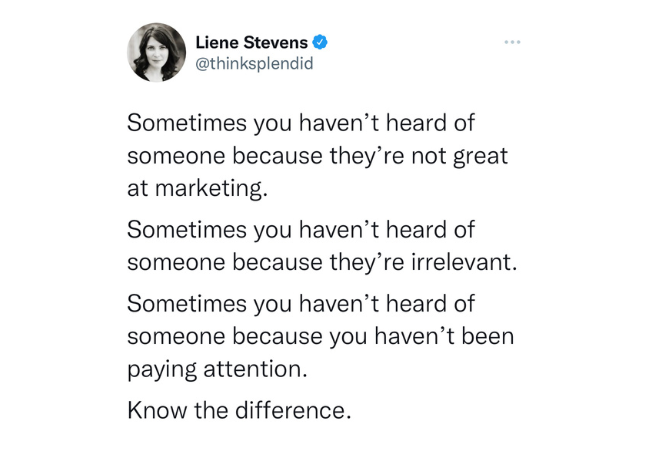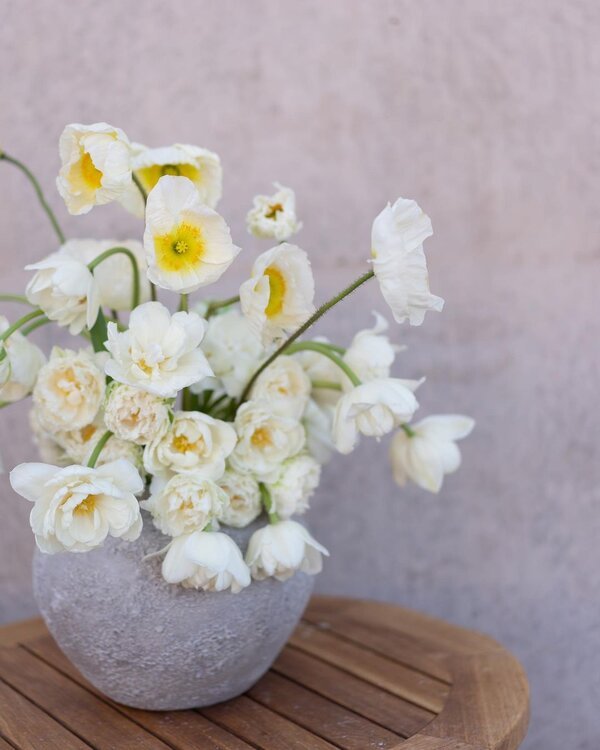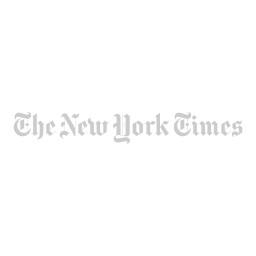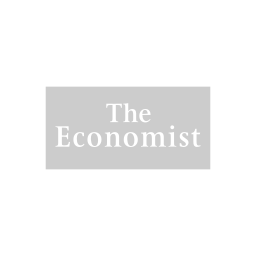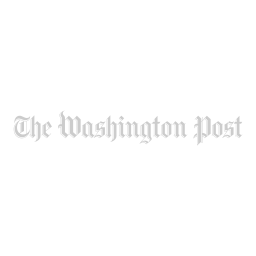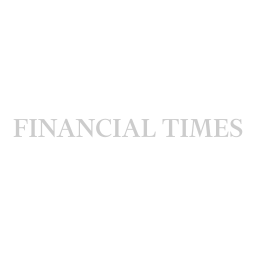Or the “top wedding photographers” lists?
Real wedding photo by Cameron Clark
This question is from a luxury wedding planner:
Something was brought up by a few people in the last couple weeks and I wanted to get your insight.
Are the "Top" and “Best of” lists from magazines and websites vetted and earned or are they marketed/PR'd onto?
One of the "Top" lists came out recently that named a wedding planner to the list who has limited experience (less than five years in business, two of those while closed during Covid) and almost no social proof of planning work.
It seems like this editor was looking to mark "diversify" off the list and added this person based on a half dozen editorials and styled shoots rather than doing a little digging to see that the greatest portion of their "portfolio" was photoshoots and gathered "inspiration" images from top wedding photographers and designers. It was shocking.
For the most part, everyone believed prior to this that the lists were valid and something to maybe strive for and to be proud of. This made all of us think the exact opposite.
Getting in front of the editors that are behind these lists via a PR team seems more than fair – but when you're perhaps not an experienced professional and you're making a list; that's a different story.
Not only am I Black, but I was named to one of those lists last year and now I am wondering.
All the people discussing this are of different races; all know that I am quite comfortable with them asking me the race questions. The discussion started with the lack of experience and then someone was courageous enough to ask me, “Hey, do you think…”
Answer from Liene:
I have been asked some version of your question by a couple dozen different wedding pros. A lot of people in the industry are curious about how these “best of” lists work and their actual merit.
I’m going to be real from the jump: my answers are not necessarily going to be what everyone wants to hear. Not the wedding pros who have been featured on these lists, not the people who have yet to be included on them, and not the editors who put them together.
It’s a more complicated issue than it may seem on the surface, with a lot of nuanced factors and interconnected parts.
That said, it’s an important topic and I’m glad you reached out with your question because we do not shy away from the challenging stuff here.
There are a few things to unpack in your question’s scenario:
Whether or not being named to these lists matters and if it’s something a wedding business should “strive for”
The perception of a wedding professional’s expertise and who deserves to be on these lists
How the "top wedding professional" and "best of" lists are sourced and the extent to which they are vetted
The recent efforts by media brands to publish wedding content that is more diverse and inclusive than in the past
I also want to be clear that we are talking about “best of” lists where you do not pay the publication to be included nor do you have to advertise with them to be considered.
These are not the wedding pro directories you pay to be listed in or memberships in paid wedding vendor groups that include an element of promotion to a wider network (Instagram takeovers, dedicated newsletter features, etc).
While these directories and groups may have their own application and vetting process, they are a form of paid advertising – which is an entirely different aspect of marketing than what we are talking about today.
The Real Purpose of a “Best of” List
Let’s start by talking about why lists like these exist at all.
“Best of” lists are first and foremost a marketing tactic for the brand that publishes them.
They can be a huge traffic source and since many of the media brands (Vogue, Harper’s Bazaar, Town & Country, Brides, Martha Stewart Weddings, etc) owned by larger parent companies (Condé Nast, Hearst, Meredith, etc) generate part of their ad revenue from page views rather than paid wedding vendor directories, these “best wedding professionals” lists are a strategic way to drive more people to their online content.
This content helps their SEO (being featured does not help your own SEO), and is also a way for them to get in front of a wider audience by creating a chance for multiple wedding pros to drive traffic and word of mouth by sharing the links with their respective followers.
Brides did this especially well this year by creating Instagram-ready custom graphics for each of the 209 wedding professionals on their lists which included photos of the respective vendor’s work, the list’s name, plus the Brides logo.
In addition to driving traffic to their site, this generated a huge amount of brand awareness for Brides as their logo received millions of impressions on Instagram alone from the graphics being shared. It was an incredibly smart campaign on their part.
These magazines and websites are also not the ones who originated this concept – pretty much all awards and “top” lists started this way. The Oscars were first created as a way to increase membership in The Academy. So were the Emmys. An organization positioning themselves as an authority on who or what is “best” is a form of marketing that has been around forever.
This isn’t to say these accolades can’t be valid or that there isn’t some sort of win-win element. It’s just to point out that their primary purpose is to promote the publication’s brand and generate revenue for their own company. Helping the audience in some form is second. Promoting you is third.
Remembering this fact can also be helpful in keeping the temptation to drink your own kool-aid in check. You may be on these lists, but they are really not about you at all.
Does being named to a “best of” list matter for a wedding professional?
The Short Answer
Yes and no.
The Real Money Potential
Being published on a “best of” list has the potential to bring in very real money for a wedding business.
Wedding market research shows that, on average, wedding planners earn 56% more revenue annually as a result of getting published, including on these lists. Wedding photographers earn 73% more.
For easy math, we’re going to use round numbers:
If you’re a planner earning $100,000 in gross revenue a year, you’re now bringing in $156,000.
If you’re a photographer, you’re now bringing in $173,000.
Here’s some longer-term math: Let’s say you run your business super lean, can cover the additional taxes from your base $100k revenue, and don’t need to spend any of that extra money. It’s all profit.
If you stick that extra $56,000 under the sofa in your office each year, after 10 years you’ll have $560,000.
If you invest that extra $56,000 in a boring index fund like an ETF each year at a 6% return rate, after 10 years you’ll have $782,411.99.
A wedding photographer would have $1,019,929.91.
It’s hard to argue that an extra half-a-million dollars or more doesn’t matter to a wedding professional, especially after 2020 when so many had to make tough financial decisions just to stay in business.
Other Benefits of Being on a “Best Wedding Professionals” List
Aside from a potential bride or groom finding you through being published on a list of best wedding pros, there are other ways these lists can be used to generate revenue for a wedding business:
If you want to sell your company at some point, being on these lists can increase your brand value and give you leverage in negotiating more favorable terms and a higher sale price.
Many business owners have an exit strategy that includes stacking up awards and spots on “best of” lists for this reason.
They are playing the long game and their goals for being included on these lists have more to do with securing a long-term financial legacy for their family and building generational wealth than anything else.Being on these lists serves as a stamp of approval on your expertise and can help you land things like spokesperson deals, book deals, and TV gigs.
Being recognized on a “best of” list can also help you build a more widely known brand name that can be leveraged for mass market retail opportunities like licensing deals or your own line of products at big box retailers like Target, Michael’s, or Home Depot.
These lists act as third-party credibility – a key part of social proof – which means that a potential client who didn’t find you through that list but sees it in your Instagram bio or on your press page will subconsciously assume you are more trustworthy.
The more famous and established the brand that created the list – such as Vogue, Harper’s Bazaar, Town & Country – the more this phenomenon holds true. It is “guilt by association” – in a good way.
Being published on a “top wedding pros” list doesn’t result in instant money falling into your lap, obviously. But it can open the door to lucrative opportunities that may have previously been much further down the road. You will still need to be strategic about how you take advantage of this type of press and put in the work to make that 56%+ revenue bump materialize.
How Being Included On a “Best Of” List Doesn’t Matter
Being on a “best of” list can make a wedding professional more money, but it does not make a wedding professional more important.
Where I often see many wedding pros get tripped up is that they wrap up their personal self-worth or identity as a creative artist in these “best of” lists. They start to obsess over them and tend to view being included on them as entrée to wedding celebrity status.
Here’s the truth about wedding industry “fame” : it largely doesn’t exist and you’re most likely not the exception to that rule.
Having more than 1 million TikTok followers or 100k Instagram followers does not make you a celebrity.
Having a blue checkmark on Instagram, TikTok, or Twitter does not make you a celebrity.
Appearing on a few episodes of reality TV does not make you a celebrity.
Having famous clients or friends does not make you a celebrity.
Being on the “speaking circuit” does not make you a celebrity.
Being able to charge $40k+ for your services does not make you a celebrity.
Being named a “best wedding professional” by Vogue or on Forbes “30 Under 30” does not make you a celebrity.
Here's how to know whether or not you are a true celebrity:
If you were to get divorced, would TMZ report on it?
Not married.
Divorced.
No? Then you are not a celebrity.
By this measure, you can count the number of wedding industry celebrities on less than one hand – and their names are rarely ever on these “best wedding pros” lists.
This doesn’t mean you and the work you do are not valuable, it just means you are not a celeb. You don’t need to be famous to do meaningful work and you certainly don’t need to be famous in order for your own life to have meaning.
You as a person are enough. With or without these lists.
Getting Honest With Yourself
That said, knowing all these things doesn’t necessarily make you feel better when the wedding industry often treats these lists like a VIP cool kids club.
It is human nature to feel good when we’re included or receiving recognition and to feel bad when we’re excluded or overlooked. These feelings are valid but it’s important to remember that the internal dialogue they prompt is not always true.
You can use these questions from my friend Dr. Vidal Annan, a clinical psychologist for entrepreneurs, to evaluate the automatic thoughts your feelings bring up:
Is this thought helping me right now?
Is this thought moving me toward my goal?
Is there profit in this thought?
Answering these questions honestly can help you hit pause on any pity party or kool-aid sipping your ego may be indulging in and get back to focusing on your true priorities.
If you find yourself getting too wrapped up in wedding industry politics, I also recommend spending some time with the kids in your life (your kids, your nieces or nephews, your grandchildren, your bff’s kids).
I say this because kids just DO NOT CARE about any type of career success you've achieved. They are not impressed by what adults are impressed by.
I personally find this refreshing – being actively present with them always gets me out of my own head and grounds me in what actually matters in relation to the big picture.
Being featured on these lists can be a strategic marketing and business tool and they can bring in real money. Striving to be included so you can continue to build a business that supports your definition of a remarkable life is valid.
Just be careful that you don’t turn a “best of” list into an idol and definitely don’t let it dictate your personal self-worth.
Which wedding professionals deserve to be on a “best of” list?
The Short Answer
Many who have been and many who haven’t.
A Note on Social Proof
Social proof is important but often misunderstood and misapplied.
For those unfamiliar with it, the term “social proof” was coined in the 1980’s by one of my college social psychology professors, Dr. Robert Cialdini. It is one of the six principles of influence (now seven) and refers to a person taking their cues from others to align with or adapt to what the group has deemed acceptable. How social proof is leveraged was a key focus of my thesis research.
At its core, social proof can basically be summed up as, “if something’s popular, it must be trustworthy.”
Social proof (aka the “informational social influence theory”) is why anything becomes a trend – others see that something has been anointed as worth having/being/doing/believing and decide they too need it in order to show that they also have the “right kind” of taste/judgment/behavior/ideas.
Social proof is why every single beauty, fashion, or wellness product that has gone viral on TikTok has sold out. Social proof is also why unscrupulous leaders can easily stoke a mob mentality by spreading disinfo campaigns and conspiracy theories. It can be leveraged in both positive and negative ways.
For a wedding business, social proof can include things like:
Client reviews, case studies, photos of real weddings (all proof that people trusted you enough to give you money)
Number of newsletter subscribers, press interviews, speaking engagements (all proof that people thought your perspective and expertise was worth paying attention to)
Blue checkmarks, awards, spots on the “best wedding professionals” lists (all proof that someone in an authority/gatekeeper position deemed you worthy of their stamp of approval)
It is normal to find a business with almost no publicly visible social proof suspicious – humans are pack animals and we associate safety with numbers. That does not mean our suspicions and assumptions are always correct. What we don’t see can sometimes be more important than what we do.
1/3rd of Luxury Wedding Pros Aren’t on Instagram or the Conference Circuit
Some of the very best luxury wedding professionals don’t use Instagram and don’t share their events publicly. They’ve never been invited to speak at wedding conferences and they don’t attend them.
This is not just a few people – a solid third of the luxury wedding industry is made up of creative professionals who fly under the radar and are legitimately just as good as, or better than, your industry faves.
Since these wedding pros can’t publish their work due to NDAs, these lists are a type of press that can be beneficial for their business and revenue goals. More importantly, they’re a type of press that doesn’t scare away a client base that values (and pays for) discretion and privacy.
You may have never heard of them, but if we’re going to talk about who is best and these people are not included, then that list is not truly a “best of” list.
When What You See Is (Much) Less Than What You Get
This may not apply to the specific wedding planner you are referencing in your question but I have found that a lot of people tend to assume that if someone is new to the industry, they are new to the job itself. Or they assume that if the person is new to them, they are new to the work.
This is not always the case. It is true that a lot of people in the wedding industry started with no events experience after switching careers from an entirely unrelated field as an attorney, social worker, investment banker, etc. It is also true that many people came to the industry after doing related work in another setting as corporate event planners, news and political photojournalists, architects, etc.
In 2008, many young event planners were laid off from their in-house jobs at giant corporations – where they were earning six-figure salaries and planning 200+ events per year – and decided to open up shop for themselves. At the time, almost everyone in the wedding industry labeled these newcomers as inexperienced, entitled millennials because they had the audacity to charge their worth and land press for their new companies.
A person who planned close to 1,000 events in the 3-5 years they were in-house at a corporation has the skills required to plan a complex wedding. They already know all about permit processes, load-ins, union labor laws, supply chain factors, complicated budgets, multi-page schedules, managing egos, etc. They can do all this in their sleep. They may have been new to entrepreneurship, but they weren’t new to the work.
We are seeing this happen again, as a ton of people realized during the pandemic that the life they had been leading up until we were all collectively forced to hit pause was not exactly the one they wanted. A significant factor in the Great Recession is people embracing the fact that life is short and deciding to take their talent and pursue something more personally and creatively fulfilling.
There are usually a few people like this on these “best of” lists. They have the experience but don’t necessarily have the legal rights to show work performed for another company in their own portfolio. The expertise is there, the visible social proof is not.
Young Prodigies Will Be the New Norm
Or consider the case of a 23 year old videographer who started attending a Young Filmmakers camp every Summer when they were 10 . . . which was in 2009.
Digital cameras and editing technology were already incredibly advanced. They had legit Hollywood directors, cinematographers, and video editors as their program instructors, and were able to intern with some of them after they went off to college. While in college, they started shooting weddings on the weekends to pay their tuition, just like so many others now established in the wedding photo and video space did.
I've seen their wedding films and they are GOOD (and you all know I'm difficult to impress). They already have more talent and technical skill than many of the veteran wedding videographers twice their age.
They may not have a ton of years in the wedding industry yet, but if we're talking about "best" from a pure talent and product standpoint, then they deserve to be on these lists, even at 23.
I mention this example in particular because “young prodigies” are not going to be the exception to the rule anymore.
Most professional athletes go pro very young – right out of high school or college – and almost all of them got on track to do so by being immersed in specialized sports programs as kids. It is what they trained for and focused on for years before adulthood.
Immersive tech and art programs for kids, such as that Young Filmmakers camp, are a huge part of Generation Z's upbringing – and they are far more specialized and advanced than any of the extracurriculars millennials were enrolled in.
Over the next decade, we are going to see a wave of highly skilled creatives who aren't yet old enough to drink enter the wedding industry. We will see this especially in the fields where the creative product depends heavily on tech products: photography, videography, DJ entertainment, etc.
And these new wedding pros will be good at the work because, just like a young pro athlete, they've been training for this for years. They will be legitimate competition for you – both for clients and spots on the "best of" lists.
Patience may be a virtue, but when it comes to paying your dues or paying your bills, paying your bills wins out. If being recognized for their talent and skill means a chance at a significant bump in revenue, young wedding pros are going to choose to break the unspoken industry rules and skip ahead of an archaic and completely made up timeline of how and when someone’s “turn” should occur. And they have every right to.
When What You See Is Smoke and Mirrors
The wedding industry is full of true experts who are creative and who help raise the bar for everyone. Unfortunately, it is also full of charlatans.
And make no mistake: every field within the wedding industry has charlatans in it:
“Spray and pray” photographers who don’t know how to use their cameras, manage to luck out with a couple money shots, but can’t deliver high quality consistency for a full wedding day.
Planners who agonize over two different shades of pink but never bother to put things like a groom’s deathly allergy to a common cooking spice on the BEO.
Makeup artists who don’t know basic cosmetic chemistry and can’t adjust for how products will interact with each other or a bridesmaid’s skin type.
Business coaches who have no idea how to actually run a business, can’t read a P&L, and give the same terrible advice to everyone.
Wedding pros on the speaking circuit teaching you how to be successful when their own companies have never made real money.
What the charlatans are exceptional at is smoke and mirrors. They are hoping they can fake it until they make it and some of them have been faking it for years and even decades.
Almost every “best of” list that I have ever seen has had at least one charlatan on it, often more, and a lot of times they have been here a minute and are not the newbies.
I don’t believe this means that the wedding pros who deserve the accolades should feel any less proud of their work, especially if the list only has one or two undeserving people on it.
Smoke and mirrors can be tricky and often dupe more people in the industry than just editors.
How are the “best of” lists sourced and to what extent are they vetted?
The Short Answer
It depends on the editor.
How Do Editors Find Wedding Pros for a “Best Of” List?
The “best of” lists are sourced only to the extent a publication’s editors pay attention. That attention span varies editor to editor.
Some editors make it a point to stay in the loop and pride themselves on extensive research and “discovering” unsung talent.
Some consider recommendations from wedding pros and PR reps who are in their database from submitting real weddings and pitching stories in the past. And yes, sometimes the pitch angle is why they should be included on the next round of “top” lists.
Others choose from an Instagram hashtag search and the people they’ve met “in real life” through wedding conferences and other industry events such as NY Bridal Fashion Week, an association’s networking mixers, FAM trips, etc.
The best editors use all of the above methods (and more) to find potential candidates for their lists.
This also means that a magazine’s lists may have once been compiled from a wider consideration of wedding pros, but when that editor moved on to a new job years later, they were replaced with someone who mainly stuck to their friends.
The Nature of a List
By it’s very nature, a list is finite. It cannot include everyone who deserves to be on it.
Because the publication needs to put out new content, a “best of” list also can’t be made up of all the same people each year. Did people who were best last year suddenly become less best this year? Highly unlikely.
Another factor is that while there may be some overlap, a publication’s “top wedding planners” list should not be identical to a competitor’s. They have different marketing and business considerations.
There are also going to be a few wedding pros who – because of how their influence has had a measurable impact on the broader wedding industry and not just their own company – need to be included in order for a list to have any shred of credibility. A “best wedding photographers” list that doesn’t have José Villa on it is not going to be taken seriously.
Audience Considerations
In addition, many editors try to choose wedding companies that are relevant to specific demographics and psychographics of their target audience, such as household income level, career type, travel preferences, and lifestyle interests.
From a practical business standpoint, a luxury magazine’s list should be a mix of wedding pros who work primarily with Ultra-High Net Worth Individuals (defined as having a minimum of $30 million in liquid assets) and wedding pros who are expensive-yet-attainable for brides and grooms who fall in the Very High Net Worth ($5M) or High Net Worth ($1M) wealth categories.
For example, it is unlikely that Town & Country magazine – whose audience has an average net worth of $2.3 million – is going to include a wedding planner who mostly works with $85,000 budgets. It doesn’t matter that the planner is incredibly talented or that an $85k wedding is aspirational and completely out of reach for a lot of people. It is considered a small wedding budget by their readers and would be out of sync for the magazine’s luxury brand image.
Remember that these lists are primarily about driving revenue for the media brand, which means their content needs to be relevant to their specific readers. It is not meant to be relevant to everyone.
False Humility Can Harm You Just as Much as Ego Can
When it comes to the charlatans I mentioned previously, a lot of people don’t know what they don’t know – including editors who may not work in the wedding industry full time.
To stand out to an editor who is researching which wedding pros to consider, you will have to show what sets you apart from the fakers and the takers.
Part of this means literally calling yourself an expert.
There are a ton of wedding professionals who are experts but refuse to identify as such. If that’s you: please get over yourself and start unapologetically owning what you bring to the table.
Yes, you have to use the word “expert.”
Not “industry veteran.”
Not “seasoned wedding pro.”
Not “creative artist” and definitely not “creative partner.”
EXPERT.
This isn’t about calling yourself something you’re not (and if you’re truly unsure, here’s some criteria on what makes an expert). It’s about getting out of your own way.
I know that using the word expert to refer to yourself can be uncomfortable. I also know that staying in your comfort zone of false humility holds you back.
Consider this: Warren Buffett and his long-time business partner, Charlie Munger, famously devote 80% of their day to reading. Are we going to say they aren't experts in finance or investing because they set aside so much time to continue learning?
Of course not.
True experts know that if they’ve “arrived,” they’ve settled. They know there is always more to learn, more areas in which to improve.
Here’s one reason why this particular word is so important: over 90% of journalists, editors, and producers use the term “expert” when they are researching sources for features and stories. If the only people willing to call themselves experts are the charlatans, they are the ones who will get noticed.
You can’t be noticed if you can’t be found and it is more difficult to be found if you won’t use the word that your talent, skill, and specialized knowledge has earned. True humility doesn’t hide its gifts.
Doing the Homework
Putting a solid list together requires extra legwork on an editor’s part, but it cannot monopolize their time. It is still just one of the hundreds or thousands of articles the publication needs to put out each year.
When it comes to vetting, some editors do extensive homework and some don’t.
The ones who source more widely tend to spend more time figuring out a wedding pro’s chops beyond their iG grid and the context of their marketing.
For the most part, they know how to evaluate what they’re looking at and can usually tell the difference between a table that was well-styled for Instagram and an event that was well-produced in real life.
Some ask for references, but most don’t.
I have also heard some editors straight up say that the lists they put together don’t actually matter and that wedding pros shouldn’t care about them at all. While they are correct that they don’t matter from a personal validation standpoint, these remarks show zero understanding of the real financial impact being published on a best of list can have on a wedding business.
ALL of the editors are busy and several also cover content verticals other than weddings.
Sometimes even those who are normally good about digging in find themselves racing to meet a deadline. When this happens, they might make their decisions based on a quick Instagram scroll or go by the social proof of follower counts or add the person they met sitting by the pool at a conference simply because they were top of mind at the time the article needed to be filed.
Procrastination is not a great excuse, but it does happen in real life and editors are real people and sometimes they phone it in. Just like every other human on the planet has done at least once in their career.
The Lucky Breaks
As noted before, there are always charlatans who charm their way in and almost every list ends up including wedding professionals who completely misrepresent themselves. These people intentionally mislead others with their smoke and mirrors.
There are sometimes other wedding pros who are added to these lists simply because the editor was in a hurry and liked the look of their Instagram aesthetic.
Their feeds are typically what you described: styled shoots they’ve created to help potential clients visualize what they could do for them and curated inspiration from (and credited to) other sources. They don’t go out of their way to advertise that they are new, but they don’t lie about it either.
If an editor includes an inexperienced wedding pro on a “best of” list, is that person supposed to channel their inner Mother Teresa and turn it down because they haven’t yet earned it?
Would you?
I don’t know, maybe you would. Or maybe, like most people, you would be self-aware enough to recognize that being labeled “best” prematurely was a lucky break and use it as motivation to step up your game.
An editor not doing sufficient homework is not the wedding pro’s fault, especially if being included was an unsolicited surprise. Sometimes completely undeserved opportunities fall in our laps and we pinch ourselves, say thank you, and make the most of them.
In my opinion, there are usually other people on the lists to be more upset about.
I would personally take a “best of” list that includes a less experienced newbie who has real potential over one that features a wedding industry veteran who is a charlatan any day.
Recent Efforts by Media Brands to Diversify Their Wedding Content
The Short Answer
Nothing changes if nothing changes.
A Few Ways Systemic Racism Is Perpetuated in the Wedding Industry
Doing the work of diversity and inclusion in the wedding industry isn't about being politically correct. It's about not limiting who gets a chance at some of the opportunities that are proven to generate more income for wedding professionals.
Systemic racism in the wedding industry looks like many editors promising in 2010 to do better, not changing anything, and then acting in 2020 like wedding media having a diversity problem was brand new information.
That decade of inaction by those editors resulted in Black wedding professionals missing out on that extra $560,000+ in revenue that getting published could have brought them.
This issue isn’t limited to the editors, though.
If an editor whose only tie to the wedding industry is the 20% of their workload that handles their publication's wedding content vertical and whose corporate budgets only allow them to attend the events they're invited to cover or speak at, then the wedding pros at those events are going to be the ones they meet "in real life."
Organizations that didn't diversify their speaker line ups for their networking events or conferences and who didn't create an inclusive experience for BIPOC members and attendees (or who straight up complained about them) further perpetuated this issue by preventing these wedding pros from meeting the editors in attendance. This may have been mostly unintentional on their part, but unintentional actions can still do damage.
If an organization is going to provide vendors the opportunity to meet an editor, then they need to do the internal work of making sure that the opportunity is actually something that wedding pros of any race or orientation will feel welcome and included at.
There’s a wage gap in the wedding industry that runs along racial lines – and it has nothing to do with the buying power of multicultural wedding clients (which is huge). BIPOC wedding pros have every right to be upset about the ways they were held back from earning more by people in “gatekeeper” positions at these publications and organizations.
How Change Gets Implemented
June 2020 was a wakeup call for the wedding industry (after many alarms that were slept through in the past). Even though the conversations about the lack of diversity and inequity had been happening, this time they prompted some actual movement in who gets to be included.
Some companies promised to change after genuine remorse that their unexamined bias had contributed to wedding industry inequity. Others didn't actually care and only made promises because they were scared of getting canceled.
When it comes to wedding media, some magazines implemented specific quotas in order to ensure the changes in who gets featured actually happened.
No one likes the word quota, but in business terms it is just a type of KPI (key performance indicator) used to measure progress towards a goal. Every company sets KPIs to determine success, so it makes sense to apply it to this as well.
The methods used to meet a diversity KPI are going to vary editor to editor. Some will put in the work to create real equity and some will apathetically prioritize optics.
Whether or not the BIPOC wedding pros an editor chooses to feature are true experts, inexperienced newbies, or straight up charlatans depends on their approach.
I can't say whether or not the planner you mentioned was included only because they are Black and the editor was looking to mark "diversify" off their checklist.
I can't say whether or not you were included on a "best of" list last year simply because you are Black.
I don't know for sure.
I do know that setting diversity KPIs is not the real problem itself. Selecting BIPOC wedding pros only on the optics of skin color and not also on talent is still a form of racism as well as a giant exercise in missing the point.
The Broader Wedding Industry’s Role
There are editors who are genuinely working to create “best of” lists made up of a diverse group of true experts. And because everything is interconnected, sometimes the actions of others hinder how credible the list ends up being.
Let's say a company holds a full-day educational wedding workshop where they diversified their speaker lineup for optics and not because they actually care about being inclusive.
They made their decisions on the non-white speakers by only looking at skin color and nothing else. They've included Black wedding pros who are legit experts and they've included some who are charlatans. They tell any editors they've invited that they will be able to meet all the top industry people.
This has been happening at multiple events since June 2020 when everyone publicly committed to change.
In my opinion, it is unfair to expect an editor on the payroll of a media conglomerate like Hearst or Condé Nast to know more about the wedding industry than the professionals who are actually in the wedding industry full-time.
Sometimes an editor ends up including charlatans on their “best of” lists because someone they considered a reputable source positioned that wedding pro as a true expert based on optics alone.
The Bottom Line is Your Bottom Line
Perfection is Never Going To Exist
Because a list is finite in nature, because the fakes can be hard to spot, because editors are human, because some people will never take the personal responsibility of examining their unconscious bias, these lists will never be 100% perfect.
There are always a handful of people who make the list who don’t deserve the honor and also a majority who do. And there are ALWAYS people who are legitimately deserving who were never considered at all.
Yes, a “best of” list has less credibility when it includes people who don’t deserve it.
Yes, it is less credible when charlatans are listed alongside legitimate experts.
Yes, it is less credible when someone who doesn’t yet have experience is included.
Yes, it is less credible when wedding pros who DO deserve it were never even considered.
And it never feels good to find out that something isn’t as perfectly credible as we thought it was.
I don’t think this means people should write off the entire list as a joke (although there are some years where a couple fit that description) but rather understand that perfection is never going to exist.
The best we can realistically hope for is a list created by an editor who did their best to get it right and didn’t apathetically phone it in.
Most importantly, a “best of” list being less credible does not make YOU less credible.
You’re still amazing at the work. You still have more creativity in your pinky finger than most people will have in a lifetime. You still have a 56-73% potential increase in pay.
Set your ego on the shelf, leverage the social proof being included on the list granted you, and go make your money.
Questions from Wedding Pros
Have a question on a sticky client issue, running a wedding company, or an aspect of business you feel you should know by now yet don’t?
Liene is happy to weigh in with her trademark compassionate yet no-nonsense advice.
To submit a question to our Wedding Pro Q+A column, send us an email. We’ll keep you anonymous.
Written by
LIENE STEVENS
Liene Stevens, the founder and CEO of Think Splendid, is an author, speaker, award-winning luxury business strategist and behavioral psychologist.
* * *
Founded in 2005 and trusted by clients in 97 countries, Think Splendid is the global leader in wedding business consulting.
We provide strategic guidance to industry leaders, luxury brands, hotels, and tourism destinations that serve high net worth and ultra-high net worth brides, grooms, and wedding guests.



